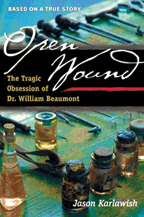What happens when a physician won’t let go.
By Kayla Rosen

OPEN WOUND: The Tragic Obsession of Dr. William Beaumont
By Jason Karlawish, faculty
University of Michigan Press, 2011. $24.
Biomedical research, or any research requiring the participation of human subjects, perpetually grapples with the problem of exploitation. The same questions arise: Is it wrong to lure someone into participating in an experiment by paying them? Is it acceptable to exploit an individual if the result will benefit all of humanity?
In his new novel Open Wound, Jason Karlawish, a professor of medicine and medical ethics at Penn, examines the tension between exploration and exploitation. Karlawish tells the story of the historical Dr. William Beaumont, a low-ranking “assistant surgeon” posted on Mackinac Island, a Northern Michigan frontier fort and desolate fur-trapping outpost. In 1822, Beaumont saves the life of Alexis St. Martin, a young French-Canadian fur trapper who sustains an accidental gunshot wound to the stomach. Out of a sense of duty and goodness, the doctor disobeys orders and puts his own career on the line to ensure that this poor indentured trapper receives optimal care in spite of his inability to pay.
Karlawish paints a picture of Beaumont as an ethical role model. His adoring wife Deborah praises him: “You truly have earned the right to be called a great man.” “I simply did my duty,” he replies. She cuts him off: “Your selfless duty to your patient … For that, you’re a hero.”
Beaumont tirelessly devotes himself to Alexis’s complex wound and takes the fur trapper into his own home as his personal charity case. But soon his motives start to appear suspect. Left with a hole exposing the interior of his stomach, Alexis begins to seem less like a needy patient and more like a novel professional opportunity for Beaumont. The inexperienced surgeon becomes obsessed with the possibilities that Alexis’s wound provides as a “window to digestion.” A mere “apprentice trained physician from Vermont,” Beaumont becomes a frontier Macbeth, poisoned by ambition.
He experiments on Alexis, exploring the mechanism of digestion, hoping that Alexis’s miraculous case will transform him into a famous and respected physician. “When my study of digestion is done,” he says, “I shall have knowledge that will change the field of medicine.”
When Deborah questions his motives and pleads with her husband to send Alexis off (he has become an unruly drunk), Beaumont responds that “to send [Alexis] off now is like throwing a pearl into a lake … If he ends up in another physician’s care, most surely I’ll hear that physician’s laughter clear across Lake Huron at the folly of the man who sent this prize off …”
Beaumont justifies the pain he forces Alexis to endure by paying him a reasonable wage, buying his indenture, manipulating him on supposedly altruistic grounds (“God has given you a great gift that you can use for the betterment of mankind”), and by highlighting his indebtedness (“I took you in so that you might live”). As time passes, and as Beaumont’s hopes and dreams do not flower in the way he had expected (just as Alexis does not behave in the way he had expected), the doctor resorts to increasingly devious tactics in his desperation to keep Alexis and his gold mine of a wound. As in any classic tragedy, Beaumont’s own life—his reputation and his relationships—suffer the consequences.
Beaumont’s tragedy occurs in the age of slavery, and Karlawish suggests that the same culture of abuse and entitlement that surrounded that institution nurtured Beaumont’s ethical blindness. Karlawish cannot resist orchestrating an interaction between Dred Scott and Beaumont. Scott did in fact travel with his master, Dr. John Emerson (also a physician), through the Prairie du Chien region where Beaumont lived at the time, though there is no evidence that they met. It comes as a shock to Beaumont that he has to struggle to maintain control of Alexis just as it must have surprised Emerson when Scott sued for his freedom.
The narrative also unfolds amidst the land battles between Native Americans and whites. In telling this little-known part of American history, Karlawish deconstructs the American dream. As the United States establishes treaties and underhandedly pays off various tribes, Beaumont contemplates Alexis’s wound and its possibilities: “there was perhaps no border to this frontier.” Beaumont will do whatever it takes for advancement, even manipulating Alexis into signing his own treaty, a legal “covenant” that establishes Beaumont’s rights to Alexis and his wound.
Karlawish offers us a nuanced cautionary tale, although in certain passages he strains to make the dialogue appropriately 19th-century. Karlawish’s stronger suit is his thoughtful way of developing a complex character. He demonstrates how an ethical person can slip—how easily those with power and high standing can take advantage of the sick and the poor. More intriguingly, Open Wound raises questions about fundamental American values like freedom, equality, progress, and ambition—and whether they can truly coexist.
Kayla Rosen M’11 is a psychiatry resident at Massachusetts General Hospital.




